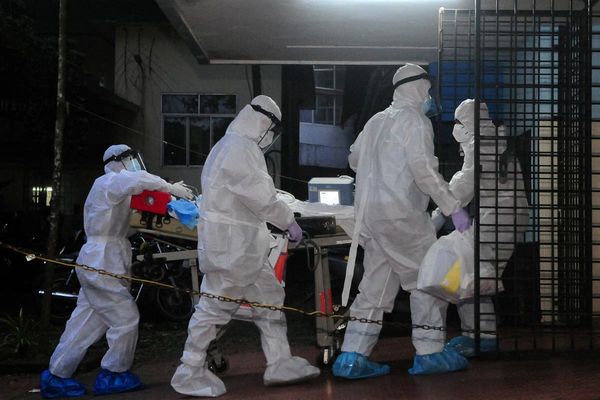
It was a regular morning for 72-year-old AK Srivastava till he was overcome by a feeling of discomfort. Within minutes he was gasping for air and veins were protruding on his face. He was soaked in cold sweat before he was taken to the hospital and nebulised.
This was on November 6, when Delhi experienced the worst pollution spell of the season, breaking the record of the great London smog of 1952.
“I am not an asthmatic by birth. It is only in the last 10 years that I have developed breathing problems. Last week, when the smog was high, I survived on oxygen support,” he said.
Srivastava, who is a retired Indian army official residing in east Delhi’s Anand Vihar, said Delhi’s scene in early November was something that he has never witnessed in the last 60 years of his stay in the city. His age, clubbed with the capital’s pollution, made him a victim of several diseases, including severe bronchial infection and deteriorating eye sight. Despite the fact that he has never touched a cigarette all his life, the doctors have told him that he has developed a condition called, ‘smoker’s lung’ — seen in the last decade in many non-smokers in Delhi.
“The sight in my left eye is deteriorating and every time the dust levels go up I can feel an itch in my eyes. Delhi is not the best place to grow old but where should I go, when my family is settled here?” he wonders.
The haze of dust that enveloped the city’s sky seemed to be a loud warning of an imminent apocalypse, says Srivastava.
“Our life is nearing end, but I fear for the next generation. My granddaughter is six years old and we do not send her out to play because of the high pollution and dust levels outside. At her age, my son would rarely stay at home. They are losing out on so much because of our inaction,” the retired army man said.
There are 2.11 crore people above the age of 60 years in the Delhi-NCR region. Advisories issued by Central Pollution Control Board (CPCB) warn that children and senior citizens should refrain from prolonged exposure to pollution when the particulate levels finer than 2.5 micrometers cross the 150 mark, the prescribed standard being 60 micrograms per cubic meter (ug/m3). A study by Global Burden of Diseases in 2015 showed that out of the 3,283 premature deaths because of exposure to toxic pollution in India, around 40% were above the age of 60.
Impact on health
Health experts said because of a spike in the pollution levels in the air, what would cause a younger and healthier person mild discomfort, can turn into a chronic and even fatal infection for an older person.
Dr Sidhant Kishore, general practitioner at a private hospital in Delhi, said that exposure to pollution can damage the already weak immunity among people who are above the age group of 60. This does not just cause immediate problems such as wheezing and shortness of breath, but also leads of severe headaches, digestive problems and forgetfulness and becomes the ground for fatal diseases such as cancer and cirrhosis.
“The damage is especially more when the person has spent his or her life in a polluted area. The tissues are already severely clogged with a lifetime of exposure. One problem in the elderly is usually enough to trigger a system breakdown,” he said.
Researchers at the University of Birmingham in the UK and University of Hong Kong recruited 66,280 people aged 65 or older between 1998 and 2001, and followed their mortality outcomes up to 2011. Causes of death were ascertained based on Hong Kong registrations.
The study established the link between PM2.5 and cancers of the upper digestive tract.
Complications
It does not just affect a person’s lungs but it also damages the brain, skin and eyesight. Savitri Kumari, a 62-year-old retired teacher, is a typical example of how high levels of pollutants in the air can slowly eat up your immune system.
Kumari has been suffering from venous thrombosis — a condition which forms blood clots in the veins obstructing blood blow into the system.
A research paper published in US’s National Institute of Health this year found a direct relation between air pollution and venous thrombosis. The study said that the components in particulate matter (PM) such as nitrate, sulphates, elemental and organic carbon, organic compounds and endotoxins are responsible for more people falling prey to this disease, which was till a few years back a rare condition.
“I do not have any genetic history of thrombosis and the doctors at All India Institute of Medical Sciences (AIIMS) have asked me to spend the winters away from Delhi, if I can, because the pain shoots when the temperature drops and the pollution levels spike,” she said.
If she misses her medicines even for a day, the veins in her things and arms become red and inflate. A resident of west Delhi’s Uttam Nagar, in 2014, Kumari was given an offer to take extra classes for weak students in her school after her retirement, but her regular pains forced her to decline the offer.
“I loved teaching and would have happily accepted the offer but my health did not allow me to,” she said, with an expression of regret on her face.

- Dry persistent cough or phlegm discharge, chest tightness, pain in the chest when deep breathing, susceptible to chronic and frequent respiratory tract and lung infections, pneumonia

- Build up of deposits on the inner lining of the arteries, causing blood vessels to rupture,

- Stroke due to blockage of artery that cuts the blood supply to brain

- Poisonous gases combine with blood and reduces oxygen levels, dizziness, feeling faint, woozy, weak or unsteady, fatigue

- Watery eyes, irritation of the cornea or inflammation of conjunctiva

- Blocked nose, sneezing

- Avoid stepping out during early morning and late evening
- Avoid passive smoking as far as possible
- Keep potted plants inside the house to reduce indoor pollution levels
- Install an air purifier at home
- Always keep windows of your car rolled up when travelling; keep car AC in a closed circuit
- Get carpets, curtains and upholstery cleaned regularly
- Minimise use of plastic items, opt for glass or steel instead
- Use an exhaust fan when cooking or bathing
Weaker social connection
Ravinder Singh Shekhawat, a 68-year-old resident of Vasant Kunj is a member of the laughing club in his neighbourhood.
A group of over a dozen elderly in his area get together for an hour in the early hours of morning everyday do a bit of yoga, walk and spend a few minutes doing the laughter therapy.
Every year after Diwali, however, their club has a week off. The spike in the pollution levels in the city, after the celebration with firecrackers, is not something that many in the club cannot bear.
This year, however, the club has not had a single meeting since Diwali.
“We haven’t been able to meet because of the bad pollution levels outside. We read the newspapers and go into panic mode. Our club’s aim is to make the most of the retired phase of our lives, to help our members live a health life. But stepping out now would mean harming their health more,” he said.
Shekhawat said they are waiting for pollution levels to get better before they can get back to their morning routine.
To raise awareness about the harmful effects of firecrackers, Shekhawat has also been organising several awareness drives around the locality.
“Last year we went to every house in our colony and explained to people how burning crackers might bring a day’s fun but it is a month’s health problem for oldies like us. We did the same this year as well, as much as our old bones allowed,” he said.







